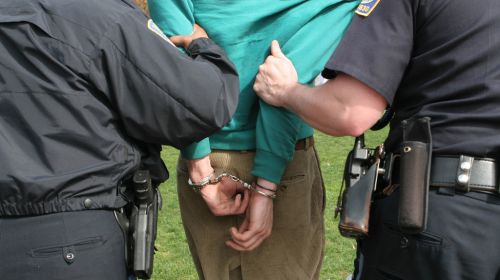
We know that photographers have been having problems all over the country with police harassment, and that demonstrators’ free speech rights have also been under assault. But with the Democratic and Republican political conventions coming up, we have all too much reason to expect that free speech rights will be swallowed up in the vortex of those events, which have become constitutional black holes in recent years.
Chris Hansen, our senior First Amendment attorney, has been litigating First Amendment cases for many years, including landmark cases such as Reno v. ACLU, and a number involving the free speech rights of protesters. I asked him to give me an overview of the situation, and he said that we’ve been seeing three big problems that come up increasingly at all these kinds of events:
1) “Free Speech Zones.” People wishing to express themselves are being sent to distant locations—euphemistically called “Free Speech Zones”—so they are inaccessible to the audience at the event. (There is one legitimate Free Speech Zone we don’t have a problem with, it’s called the United States of America.)
2) Arrests. People are simply being swept up and arrested, essentially for no reason at all, in order to clear the streets. Cities figure that they can just deal with the ensuing litigation later. They don’t much care that they don’t have grounds to arrest people, they just sweep the streets.
3) Surveillance. Unjustified surveillance is common, both prior to and during the event. Recent stories suggest that there is a lot more infiltration of protest organizers taking place than we had realized at first. But then there’s also the surveillance that takes place at the event, where often everything is filmed. Even worse are the new restrictions on what you can carry into the demonstrations, which give the police the authority to search you as you go in.
These rights violations are happening repeatedly, despite lawsuits that are filed and won after the event is over. Chris tells me, “the cities view it as a cost of doing business.”
Consciously and intentionally violating the law and Constitution is apparently viewed as a legitimate tactic by the same police and officials who are supposed to be enforcing the law. Chris Hansen adds,
It’s an accelerating pattern, and a remarkably consistent pattern. In other words, there don’t seem to be significant city-by-city variations in police behavior; there seems to be a playbook for police departments that they’re all using.
Chris says that when attorneys for protesters try to seek legal protection in advance, the cities respond by using various tricks they have learned to get around legal oversight. For example, with respect to the free speech zones, he says:
We’ve tried. Part of the problem is the city often won’t tell you until the last minute where you’ll be allowed to demonstrate. So if you go into court six months before the event, the city says, “we haven’t made any decisions yet,” and the judge says “well, how can I decide this in the abstract?” But if you wait for the police to announce the location right before the event, the judge often says, “I don’t have time to second-guess the city, I’m just going to let it go.”
So the cities have learned that if they keep the location information secret up until the very last minute, for the most part judges aren’t going to second-guess their decision, so they end up sending you six miles away, under a bridge. That’s the classic example, in Boston, where they were literally under the highway.
It’s sad and ironic that the political conventions, which at some level are supposed to represent democracy and freedom, have become empty, stage-managed, institutionalized, Soviet-style show events, while simultaneously becoming the occasion to sell out real individuals’ actual, ground-level free speech rights as a “cost of doing business.”


